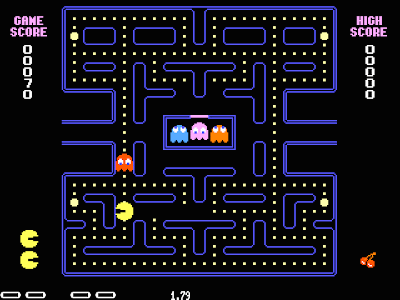>
A small introduction of Mr. Iwatani, he has been working for Bandai/Namco (we always say Namco/Bandai?) for 30 years as producer of more than 50 different games from Arcade games to Nintendo and PlayStation. He started teaching game-design at the University in 2007.
The first question I dared to ask to the God that created Pac-Man (and many more games at Namco like Time Crisis and Ridge Racer), was: “What makes a good game a great game?”
His first reply was: “Did you analyze Pac-Man”? With a big smile on his face. I told him I did, but I would rather hear the arguments from the creator of Pac-Man, than from myself, a guy that ‘just’ wrote a book about games as a marketing tool. He laughed and replied…
A good game needs to be really, really easy to understand.
If the goal of the game is not clear instantly, people will not play it. If you have to explain the rules through a demo or tutorial, people will be likely not to play it. If someone has to explain the rules to you, you will not want to play it…
Pac-Man is easy to understand, you know what to do as soon as the countdown hits ‘GO!’
The game also contains many psychological elements in one environment. The labyrinth is always easy to comprehend and not too complex. Eating the cookies (the big dots) enables the player to eat the ghosts instead of the other way around, which makes the players feel good. Being able to escape through the side-doors gives a feeling of ‘being able to escape’.
And finally, when Pac-Man gets caught by the ghosts, the game will be slightly easier for a short period of time. This encourages the player after ‘failing’.
It surprised me that so many psychological elements were deliberately put in the game already 30 years ago when games were just emerging.
My second question was ‘what IS the Pac-Man’ character actually? Is he a moon, a pizza missing a slice or what? The answer to that question was: he is a nice – happy -guy that likes to eat. There were also variations in games where he could eat bad things like nuclear weapons.
The third question I asked was how Mr. Iwatani sees games as a marketing tool and he strongly believes that games will be around us in the future like water. It will be a common way of learning and interacting with appliances around us, without even noticing that we are playing games. Games will be applicable more and more in everyday life.
I was also happy that he believes that serious games are not a genre. There are just games and whether you think it’s fun or serious depends on the user and purpose. But serious purposes can be achieved in a fun-way e.g. using games….
About the future of gaming, Mr. Iwatani notices that mobile phones will be the future platforms especially when they interact with real-life, for instance in Arcade halls where you could play a game on a big iPad kind of table using your iPhone, while meeting friends and playing with them. When you leave, you should still be able to influence on critical issues within the game (keeping your character alive, defending your base, managing your resources / cutting wood, or whatever), but when you come back after a week you can benefit from the efforts and activities you undertook while away from the Arcade hall using your iPhone.
I hope this all makes sense, because it is difficult to explain in plain text… I will elaborate on the future of gaming shortly!
Take care,
Bart
Posted in Interview, Theory | No Comments »

